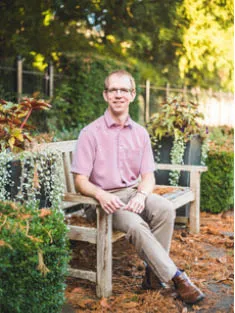Winner: 2020 Bader Award
Professor Edward Anderson
University of Oxford
For creative contributions to organic synthesis and synthetic methodology.

Organic chemistry is about creating molecules with function and creating new ways to make these molecules more efficiently and selectively. Professor Anderson’s group works on both of these areas. They have interests in the synthesis of molecules that occur in nature with bioactivity as antiparasitic agents, antibiotics, and anticancer molecules; and developing new chemical reactions that use metals as catalysts, such as the synthesis of small cage-like molecules of use as novel building blocks in drug design and the exploration of reactivity of unusual alkynes. In many of these projects, the team have an underlying interest in the theory behind the experiments and collaborate with computational chemists to develop a better understanding of fundamental reactivity.
Biography
Professor Ed Anderson completed his undergraduate degree at Oxford in 1997, and his PhD at Cambridge under the supervision of Professor Andrew Holmes in 2001. This was followed by a postdoctoral position with Professor Erik Sorensen at the Scripps Research Institute, La Jolla, working on transition metal catalysis applied to steroid synthesis, and then a Junior Research Fellowship at Homerton College, Cambridge with Professor Ian Paterson on the total synthesis of complex polyketide natural products. In 2007, Professor Anderson was appointed as an EPSRC Advanced Research Fellow in Oxford, and took up a Lectureship at Jesus College, Oxford, in 2009. He was promoted to Full Professor in 2016.
His research encompasses a wide range of organic chemistry, from the development of new synthetic methods and associated mechanistic studies, to the synthesis of small molecules and their applications in biological contexts. He collaborates with researchers in computational chemistry, parasitology, EPR spectroscopy, natural product biosynthesis, and nucleic acid chemistry, as well as with industry in the field of small caged molecules.
I’m fascinated with understanding the underlying principles behind new reactions – molecules always teach you something new!
Professor Edward Anderson
Q&A with Professor Edward Anderson
How did you first become interested in chemistry?
My interest in chemistry came from one of my chemistry teachers – and one in particular who went beyond the ‘normal’ syllabus and was very enthusiastic about the subject!
Who or what has inspired you?
My PhD supervisor Andrew Holmes has been one of my biggest inspirations – his interests in so many aspects of chemistry, and his relish of new challenges, has really influenced my own research.
What motivates you?
Discovering and developing new chemistry that we hope will be of use to others. I’m fascinated with understanding the underlying principles behind new reactions – molecules always teach you something new!
What advice would you give to a young person considering a career in chemistry?
Be open minded. Enjoy being creative. Keep learning. Recognise that you can’t do it all at once – and that’s okay!
Why do you think teamwork is important in science?
None of what we do is possible without relying on each other and supporting each other’s progress. It’s a lonely track if you try to do it all on your own – and working together, as students, postdocs or as a PI, shares the load and leads to new ideas by discussing results. It’s one of the parts of the job I enjoy most.
Why do you think interdisciplinary research and collaboration is important in science?
I really enjoy working with other researchers who bring skills that I don’t possess. It builds a more complete and in-depth piece of science, which is so important for its recognition and use by others. And of course, you form new friendships!
What is your favourite element?
It would have to be carbon.